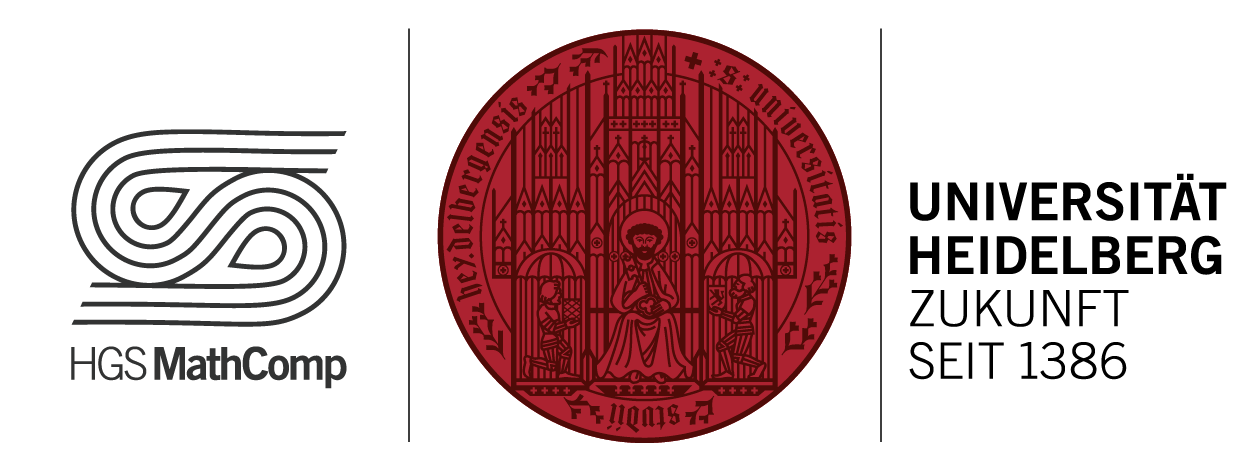HGS MathComp - Where Methods Meet Applications
The Heidelberg Graduate School of Mathematical and Computational Methods for the Sciences (HGS MathComp) at Heidelberg University is one of the leading graduate schools in Germany focusing on the complex topic of Scientific Computing. Located in a vibrant research environment, the school offers a structured interdisciplinary education for PhD students. The program supports students in pursuing innovative PhD projects with a strong application-oriented focus, ranging from mathematics, computer science, bio/life-sciences, physics, and chemical engineering sciences to cultural heritage. A strong focus is put on the mathematical and computational foundations: the theoretical underpinnings and computational abstraction and conception.
HGS MathComp Principal Investigators are leading experts in their fields, working on projects that combine mathematical and computational methodology with topical research issues. Individual mentoring for PhD candidates and career development programs ensure that graduates are fully equipped to take up top positions in industry and academia.
Location: Mathematikon • Conference Room, Room 5/104, 5th Floor • Im Neuenheimer Feld 205, 69120 Heidelberg
Registration: Please register on the course website
Organizer: Scientific Software Center (SSC)
This compact course is part of the course program of the Scientific Software Center (SSC) at Heidelberg University.
A laptop with VSCode installed is required. No prior knowledge expected.
Summary:
Tired of debugging your code by randomly sprinkling print statements throughout your code? In this course we will learn the basics of debugging with an Integrated Development Environment (IDE): Setting breakpoints, stepping through code, inspecting variables, and evaluating expressions. We exercise these techniques on small code examples from the Python language. Afterwards, we will cover other languages and more complex debugging scenarios. We use Visual Studio Code (VSCode) as our IDE, but the taught concepts translate naturally to other IDEs.
Learning Objectives:
After the course participants should be able to
- Run debug sessions in VSCode
- Know basic concepts of debuggers
- Understand some more complex debugging scenarios
14:00 - 15:40
Location: Mathematikon • Conference Room, Room 5/104, 5th Floor • Im Neuenheimer Feld 205 • 69120 Heidelberg
Organizer: HGS MathComp
The BlueSheet Meeting for all new members of HGS MathComp will be held online on Febuary 5, 2026 between 13:00–14:00.
"Prompts as Software Artifacts"
14:20 Brenda Chiteri (Supervisor S. Baltes)
"Process Mining for Software Engineering"
14:40 Marius Fracarolli (Supervisor S. Riezler)
"Exploiting Intrinsic Randomness in Ensembling for Improved Accuracy and Privacy in Predictive Models for Healthcare"
15:00 Hannes Schwab (Supervisor Z. Monfared)
"Koopman operator theory for PDEs"
15:20 Alessandro Biagiotti (Supervisor R. Strzodka)
"Data locality in parallel solvers"
09:00 - 13:00
Location: Mathematikon • Im Neuenheimer Feld 205, 69120 Heidelberg
Registration: Please register on the course website
Organizer: Scientific Software Center (SSC)
The latest information and a registration link are available on the course website.
This compact course is part of the course program of the Scientific Software Center (SSC) at Heidelberg University.
Basic Python knowledge and knowledge about data processing, ML models and training of models is required.
Summary:
The AI revolution is moving even more rapidly than the digital revolution and leads to the emergence of completely new tools and technologies that affect the scientific process. In this course, we will learn about data-based research software, tools and communities that are relevant in creating and sharing such software, and about best practices in training machine-learning models. Research software that is based on ML models requires an additional layer of best practices in the implementation, including testing of non-deterministic processes. Security aspects as well as bad examples are discussed to highlight the importance of adhering to a best practices code of conduct.
Learning Objectives:
After the course participants will
- Understand and follow best practices in the underlying dataset
- Understand and follow best practices in training ML models
- Write better data-based research software, including appropriate tests
- Avoid negative impact from legal and security issues


